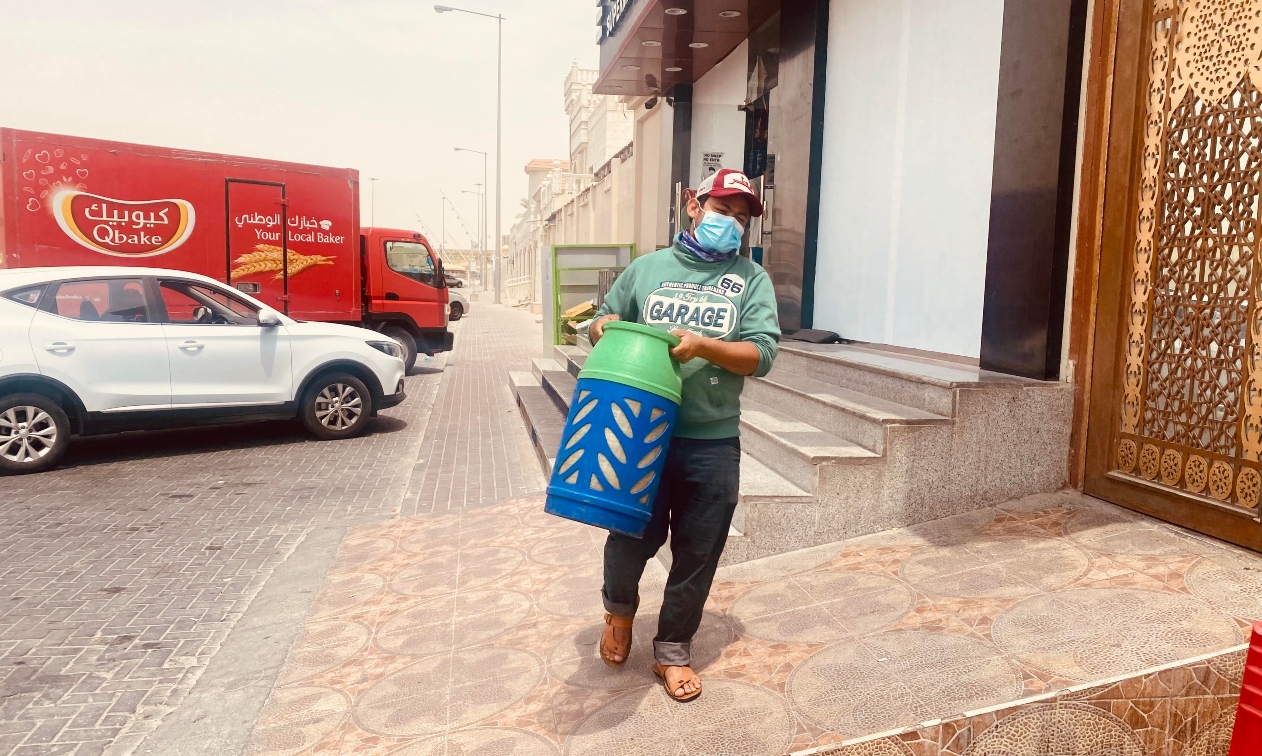Qatar: Workers bear brunt as food industry flouts labour laws during Ramadan

As in most Muslim nations, Ramadan days in Qatar are a relaxed affair, with the government fixing working hours to five a day for its workforce and six hours for the private sector.
Most private businesses in the country obey the rules, allowing workers to come late or leave early. But workers in the food industry end up working even harder during Ramadan than during the rest of the year.
A salesman working at a supermarket in the capital Doha’s Najma neighbourhood told Middle East Eye his employer makes him and his 30-plus colleagues work extra hours through Ramadan.
“Thirteen hours is the normal working day. But in Ramadan, hours can get extended because of the shoppers’ changed routine,” said the man, who in common with several workers in this piece did not wish to be identified, citing concerns for their jobs.
During Ramadan, many non-working shoppers sleep after suhoor, the pre-dawn meal, until the midday prayer. Businesses then become active in the afternoon until iftar-time, and then there is another lull until the night-time Tarawih prayer.
Many groceries and supermarkets are open until very late during the holy month, up to 2am.
“Customers coming or not, we have to be present at the shop all the time,” the salesman said.
No complaints
Like the rules around reduced working hours during Ramadan, many provisions in the Qatari labour law often remain unenforced. The law says “workers are entitled to at least one day of rest per week. Friday is the common day of rest for all workers, except those who handle shift work. No employee should work two or more Fridays in a row.”
However, the salesman and many other workers in the smaller supermarket chains, or standalone groceries, do not get the day off to which they are entitled. The salesman, who shares a room with eight co-workers, says he only has a day off once a month.
“There’s not enough time and privacy to video-call the family at home,” he said.
Only larger supermarket chains, such as the Lulu Hypermarket and Almeera, tend to give workers their weekly day off. When asked about its Ramadan working hours, Lulu’s regional manager Shanavas Padiyath said there were restrictions on what he could say.
Meanwhile, a supervisor at the Al Rawabi Group, a wholesale food delivery company with more than 200 workers, told MEE he works at least an additional hour in Ramadan, but has no complaints.
'It's pay-wash'
A shop manager at the New Matar Supermarket, located in Doha's wholesale district of Abu Hamour, told MEE that businesses have to adapt to the shoppers’ timing.
“But we make it a point that we equally distribute the burden among the staff,” said the manager.
A deliveryman at a grocery store in Al Azizia neighbourhood, on the outskirts of Doha, said he was happy with his QR2,500 ($686) monthly salary and 12-hour shift. “I get tips from the customers, too,” he said.
Asked whether he had ever wanted to resign, he said he had sometimes thought about it during his time with the grocer over the past year.
“But I get more than they promised me, QR1,500 ($412), in the contract," he said.
This is a tactic employed by many companies in Qatar in order to appease disgruntled workers.
“They offer more than the minimum wage of QR1,000 ($274) and pay more than what they offer," said Mohammed Ali, a long-time restaurant worker in Qatar.
"The employers think it will protect them against complaints workers file at the labour ministry.”
In labour disputes, one of the first things the ministry looks into is whether the salary quoted in the contract was credited or not in the Wage Protection System (WPS)-mandated bank account.
“When they see the employee got more than what he had been promised, his case gets weakened,” said Ali. "It’s pay-wash that works well against other workplace abuses and overtime without pay."
'Maltreatment, domestic violence, overwork'
Relatively well-off workers can see their stint in an abusive workplace as a learning experience. For example, the deliveryman working in Al Azizia says he doesn’t mind sharing a room with 14 colleagues.
“I will move on when my contract time is due [to expire] in a year. I have a driving licence,” he said.
Not everyone in Qatar is entitled to have a driving licence, so possessing one is always an advantage while searching for a new job.
Traditionally, Ramadan marks a month when Qatar’s domestic workers often desert the country, a fact acknowledged even by the country’s interior ministry.
In 2016, Migrant-Rights.org, a Gulf Cooperation Council-based advocacy organisation, quoted an official as listing “maltreatment, domestic violence, overwork in Ramadan and no day off in the week” as reasons for housemaids and drivers to run away from their place of work. However, no matter how abused the workers may have been, this means of escape is a crime known as "absconding" in most Gulf countries.
Qatar's e-government portal has its own page to report such individuals - entitled Submit Complaint Against Domestic Worker.
'Abusive workplace'
Meanwhile, the food industry sector’s violation of rights is not limited to lower-paid workers.
Faiz, an Indian with an MBA, who did not want to disclose his full name or the company he had worked with, said companies try to exploit every loophole in contracts to exploit workers, even if they want to leave.
Three years ago, Faiz found a job at the administrative department of a company, through his father’s connections.
By the time he was taken to the medical commission to lodge his biometric data for a residency permit, a company liaison officer had made him sign a contract printed in Arabic and Hindi - languages he barely reads. (Despite being one of India’s official languages, 56.37 percent of Indians, most of them in the south, don’t speak Hindi.)
Faiz asked the company liaison officer what was written in the contract.
He was told there was nothing to worry about and the contract period was five years, but that was just a formality.
In fact, Faiz did not get the job he had thought and was made instead to work in sales, basically operating phones. He worked for a monthly salary of QR1,500 ($412) for 12 hours a day over two years, after which he decided to resign. While serving the one-month notice period, he got a call from human resources saying he could not leave before five years' service unless he paid a QR4,000 ($1,099) "release" fee.
“I paid them and escaped the abusive workplace,” said Faiz, adding he did not want to name the company because the managers have contacts with other companies in the sector.
“Recently, while attending a job interview, the hiring managers said they knew my past bosses, and I don’t want to harm my chances,” he said.
The new normal
Rothna Begum, Human Rights Watch’s senior women's rights researcher, told MEE that Ramadan should be a time of generosity and compassion.
“Qatari authorities should remind employers and companies that workers should not be forced to work beyond eight hours a day and ensure they abide by labour laws of providing rest breaks during the day, and days off,” she said.
“The authorities should institute mechanisms for workers to complain if they are being forced to work beyond such hours against their will and without pay. And they should hold employers accountable for forcing workers to work beyond their working hours or making them work without pay."
During the beginning of the coronavirus pandemic in 2020, the Qatari cabinet exempted the “stores of foodstuffs, pharmacies, and restaurants working on deliveries and the contracting sector” from the reduced Ramadan working-hours rules. Some worry this exemption has now become considered normal.
The Qatari labour ministry has a hotline for workers to register complaints, and last month the ministry shut down 24 recruitment companies for violating labour laws. It appears that they were punished for wrong recruiting practices, rather than work-related abuses. In 2021, the ministry conducted 2,909 inspections and issued 558 warnings to companies.
Middle East Eye delivers independent and unrivalled coverage and analysis of the Middle East, North Africa and beyond. To learn more about republishing this content and the associated fees, please fill out this form. More about MEE can be found here.







